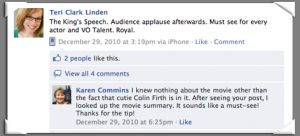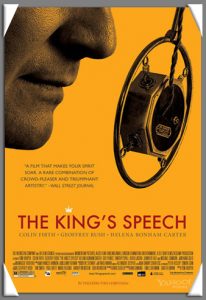

After seeing fellow voice talent Teri Clark Linden’s Facebook status last week, I was intrigued about the new movie “The King’s Speech”. Regular readers of my blog know that I often find hidden parallels to voiceover work in my life situations, as well as in books and movies. This is one instance where the similarity is obvious to anyone who views the movie, and, like Teri, I cannot recommend too highly that voice talent and actors go see this fantastic film.
Without giving away too much of the plot, King George VI (played brilliantly by Colin Firth, who should win an Oscar) is a quiet man who never wanted to be king. He was forced to take the throne after his brother King Edward VIII abdicated the crown in 1936 in favor of marriage to the twice-divorced Wallis Simpson.
People usually say the fear of public speaking is at the top of their lists of fears and stress-inducing events. In addition to the normal nervous sensation felt by everyone in front of a microphone, King George VI has a significant obstacle to overcome: a stammer developed in childhood and exacerbated throughout his life.
Enter Lionel Logue (played impeccably by Geoffrey Rush), an actor and speech therapist who works with the King to help him become the kind of public speaker necessary to lead the British people through the travails of World War II. Aside from the historical relevance, much of the delight in the movie is watching a King and a commoner learn to trust each other and find the oneness that binds all of us together.
An underlying theme that was revealed in the film is that, while Lionel Logue had his own dreams as an actor, his greatest glory was achieved due to his service to others. Indeed, to quote Ralph Waldo Trine from his 1896 book What All The World’s A-Seeking, or, The Vital Law of True Life, True Greatness, Power, and Happiness, it is through service to others that we find ourselves:
The idea has prevailed in the past, and this idea has dominated the world, that self is the great concern,–that if one would find success, greatness, happiness, he must give all attention to self, and to self alone.
This has been the great mistake, this the fatal error, this the direct opposite of the right, the true as set forth in the great immutable law that–we find our own lives in losing them in the service of others, in longer form–the more of our lives we give to others, the fuller and the richer, the greater and the grander, the more beautiful and the more happy our own lives become.
It is as that great and sweet soul who when with us lived at Concord said,–that generous giving or losing of your life which saves it. This is an expression of one of the greatest truths, of one of the greatest principles of practical ethics the world has thus far seen. In a single word, it is service,–not self but the other self.
We shall soon see, however, that our love, our service, our helpfulness to others, invariably comes back to us, intensified sometimes a hundred or a thousand or a thousand thousand fold, and this by a great, immutable law.
We also usually don’t know the impact that we are having on others when we generously share our gifts and talents with them. After seeing the movie, I did a little on-line research and discovered that Queen Elizabeth (the Queen Mother) wrote a letter praising Logue’s tremendous assistance to her husband:
I think that I know perhaps better than anyone just how much you helped the King, not only with his speech, but, through that, his whole life, and outlook on life
Just as the King’s speech affected his subjects, every voice talent has the ability to influence someone whenever we take the microphone. You’ll note that some of Logue’s coaching to the King are the same techniques that we continue to use in our field.
Even if you aren’t a voice talent or actor, the King’s courage, determination, and persistence in fighting his battle and Logue’s ever-optimistic attitude and problem-solving skills are traits worthy of emulation. Go see this movie!


Have a comment or question?